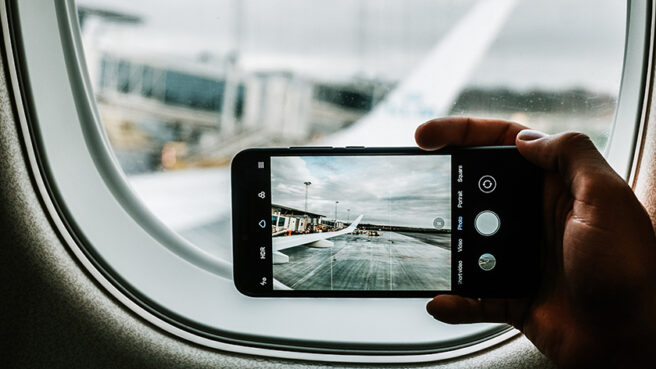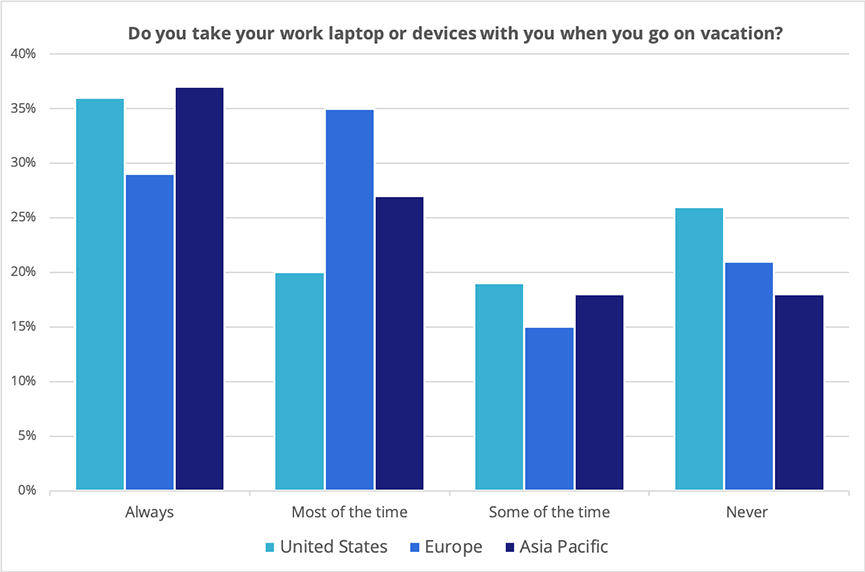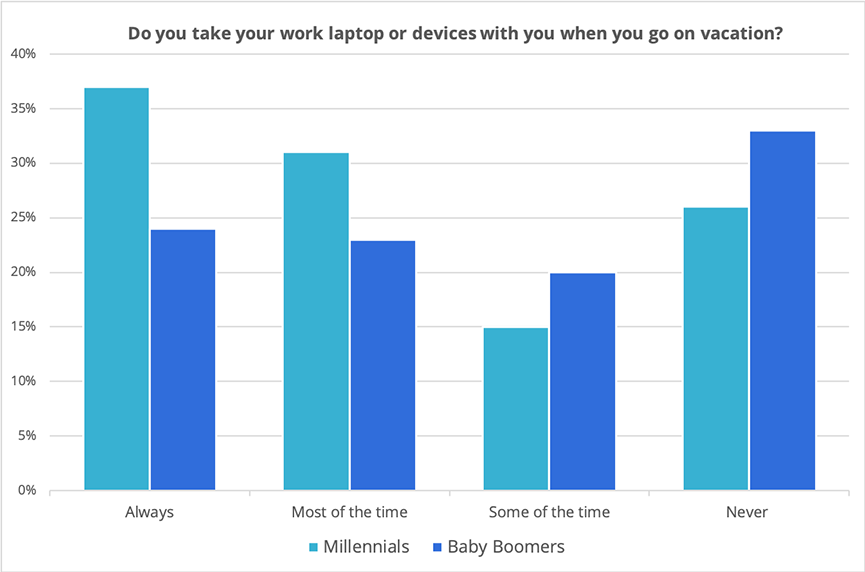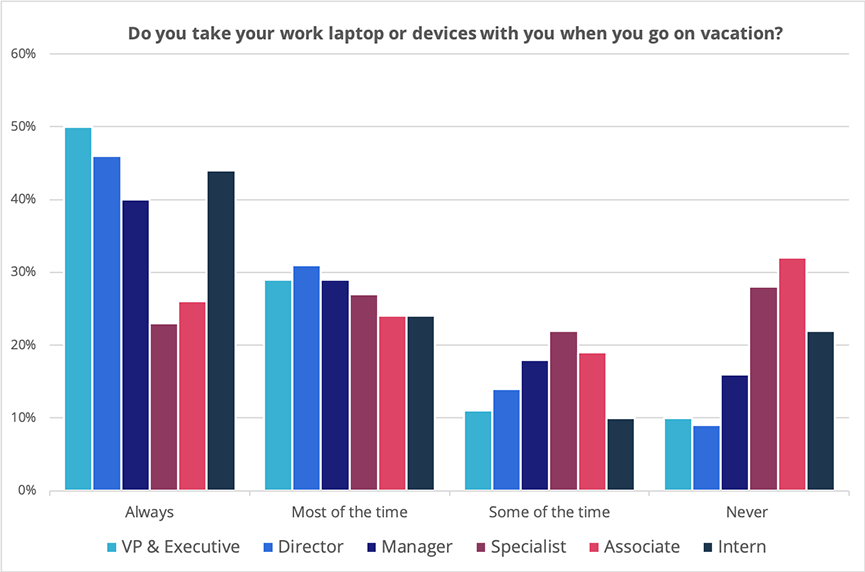CIO's Summertime Sadness: Travel Season Doesn’t Mean Workers Are Digitally Disconnecting

Summer vacation season is in full swing, but new data from Snow Software suggests that global workers have a difficult time disconnecting from their jobs while on holiday. Of the 3,000 respondents interviewed from the United States, Europe and Asia Pacific, just 22% indicated they always leave their work devices at home while on vacation. That is an alarming statistic for IT teams considering the potential for employee burnout, rising cybersecurity risks and increased probability of lost or stolen devices.
When we took a deeper look at the data, there were several trends about the global workforces’ inability to disconnect that stood out.
Debatable if Europeans or Americans are better at disconnecting

More than a third of respondents from the United States and Asia Pacific indicated that always took their work devices on vacation (36% and 37% respectively). In APAC, the results were heavily skewed based on country. Globally, India had the highest rate of always bringing their devices at 62%, followed closely by Hong Kong at 60%, with a drop off in China (36%), New Zealand (33%) and Japan (30%). Australian workers (28%) seemed to have more similarities to their European counterparts when it comes to their approach work-life balance while on vacation.
In Europe, only 29% of those surveyed in said they always brought their devices on holiday. That percentage was lowest for respondents in the United Kingdom (23%) compared to those in Germany (27%), France (34%), Spain (32%) and Italy (35%). However, 35% of Europeans reported bringing their devices along most of the time.
American workers tended to be at one extreme or the other – 36% report always bringing their work devices on vacation, while 26% say they would never bring them along. The US actually had the highest percentage of workers who always leave their devices at home. When comparing the regions based on those who said they bring their devices either always or most of the time, Europe and Asia Pacific were tied at 64%, while the US came in at 56%. These results challenge the stereotype that Europeans have the best work-life balance, at least when it comes to their technology habits.
Younger workers more likely to take work devices on vacation

Millennials represent the first generation of digital natives, so it is no surprise that 37% of younger workers claim they always bring their employer-issued devices on vacation, versus just 24% baby boomers. Conversely, 33% of boomers never take their device with them compared to only 18% of millennials who do the same.
These gaps are also reflected in how often those devices were lost or stolen while on vacation. Half of millennials have had a work device lost or stolen on vacation. Just 22% of boomers have been in the same position. Fortunately, younger workers do a better job of keeping IT in the loop when their device goes missing – they were more likely to report it to their company, 47% versus 36%, and to do more quickly.
These patterns align with our earlier look at worker behavior data released in May. Given that millennials have a more emotional attachment to their technology, it isn’t surprising that they struggle to digitally disconnect. Plus, as this generation ages through the workforce, digital native behavior is likely an indicator of future workforce trends.
Executives and interns have the highest rate of lost devices

Unsurprisingly, workers with higher level positions within an organization are more likely to take their work device on vacation, with 50% of vice presidents and C-level executives never leaving them behind. Yet 44% interns reported the same behavior.
As a result, both groups have higher probability of loss or theft of those employer-issued devices, with 65% of interns and 56% of executives reporting they’ve had a work device lost or stolen while on vacation. This is especially concerning for executives, who may have sensitive information on their devices, but also for interns, as they probably don’t need to bring their devices on holiday in the first place. While they will each require a different approach, IT teams should be proactive in addressing this issue with both demographics.
Employee response to lost or stolen devices somewhat alarming
Of all the workers surveyed globally, 58% said that they have never had their employer-issued devices lost or stolen on vacation, which is promising. Of those who have had a device lost or stolen, just 49% reported the loss to their company, with 39% doing so immediately, 24% reporting it the next day and 19% reporting it within 48 hours. Fortunately, 42% who lost a device ultimately had it returned, which may partially explain the lower reporting numbers.
While the overall number of loss incidents seems low, and the odds are good that the device will be recovered, it still creates significant risks for organizations that comply with privacy regulations like GDPR. In the end, the cost to the company does not center around the cost of the device, but the value of the data stored on the device itself. It is critical for IT departments to educate employees on this new layer of risk and encourage immediate reporting to ensure they remain in compliance.
IT tips for summer travel season
Today’s IT team may find themselves dealing with an unexpected increase of tickets over the summer as a result of employees bringing their devices on vacation. However, IT should be able to enjoy their own vacations as well, which is why it’s important for companies to prepare for these seasonal snafus.
- Strategic summer slowdown. Prepare for slower progress on transformation projects as a result of staff being unavailable. Consider whether project timelines should be pushed out or if there are groups that can continue the work, despite varied vacation schedules. This may also reduce the number of employees who feel the need to bring their work with them on holiday.
- Be mindful of tricky IT tickets. Support tickets may be harder for IT to close as people raise issues but are not around to work with IT to resolve them. Employees should be encouraged to keep their travel schedule in mind when they submit ticket to ensure they don’t overwhelm IT with requests when they are not available to help them address the issues.
- Personal devices and sensitive data don’t mix. Managers should create an environment where they can enable employees to leave their work devices at home. Should staff decide to disconnect, it’s equally important that IT and company leaders reinforce that employees should resist the urge to download sensitive files to their personal devices. This creates additional exposures for the organization including cybersecurity risks, GDPR or other compliance issues and intellectual property concerns.
- Check for updates. Of course, if you succeed in getting more workers to disconnect, IT will see a backlog in devices that require patches or updates. It is important for IT to communicate to employees coming back from vacation that they need to check their system for updates or patches that may have been issued while they were away before digging out of email.
- Keeping in touch. All teams, but especially IT, need to ensure they have complete coverage even during travel season. However, in the event of an emergency, it’s important to have your team’s contact information. If employees know their organization will only reach out in an emergency, it is less tempting for them to want to take work with them.
The survey data suggests that the less often work devices are brought on vacation, the less likely they will be lost or stolen. While it can be tempting to be on call at a moment’s notice, the best thing employers can do for their employees is encourage them to completely disconnect and enjoy their time off. In the end, this may be the best option for the company, employees and IT.